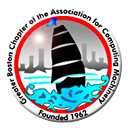The Future of Synthetic Biology

IEEE Computer Society and GBC/ACM
7:00 PM, Thursday, November 17, 2016
Broad Institute Auditorium, 415 Main St, Cambridge
The Future of Synthetic Biology
George Church
Professor of Genetics, & Health Sciences & Technology of Harvard & MIT (HST)
Director of HMS NHGRI-Center of Excellence in Genomic Science
Director of the Personal Genome Project
Broad Institute & Wyss Harvard Inst. of Biologically Inspired Engineering
Abstract: The cost of DNA I/O is dropping much faster than Moore's law (3-million fold in 7 years). The information density, longevity and energy costs for DNA are thousands to millions-fold better than conventional storage. Also, interfacing with biological, audio and visual data is more attractive and natural. I/O bio-systems (nano machines) include CRISPR Cas1/2 and Polymerases. A related effort is "Genome-Project-Write" which aims to improve technologies for building and testing human (and many other) genomes.
George Church is Professor of Genetics at Harvard Medical School and Professor of Health Sciences and Technology at Harvard and the Massachusetts Institute of Technology (MIT). He is Director of the U.S. Department of Energy Center on Bioenergy at Harvard and MIT and Director of the National Institutes of Health Center of Excellence in Genomic Science at Harvard.
George is widely recognized for his innovative contributions to genomic science and his many pioneering contributions to chemistry and biomedicine. In 1984, he developed the first direct genomic sequencing method, which resulted in the first commercial genome sequence (the human pathogen, H. pylori). He helped initiate the Human Genome Project in 1984 and the Personal Genome Project in 2005. George invented the broadly applied concepts of molecular multiplexing and tags, homologous recombination methods, and array DNA synthesizers.
George is also the co-author of "Regenesis: How Synthetic Biology Will Reinvent Nature and Ourselves". More information is online at http://www.amazon.com/dp/0465021751 .
This joint meeting of the Boston Chapter of the IEEE Computer Society and GBC/ACM will be held in the Broad Institute Auditorium (MIT building NE-30). The Broad Institute is at 415 Main St between Vassar and Ames streets. You can see it on a map at this location. The auditorium is on the ground floor near the entrance.
Up-to-date information about this and other talks is available online at http://ewh.ieee.org/r1/boston/computer/. You can sign up to receive updated status information about this talk and informational emails about future talks at http://mailman.mit.edu/mailman/listinfo/ieee-cs, our self-administered mailing list.
For more information contact Peter Mager (p.mager at computer.org)
